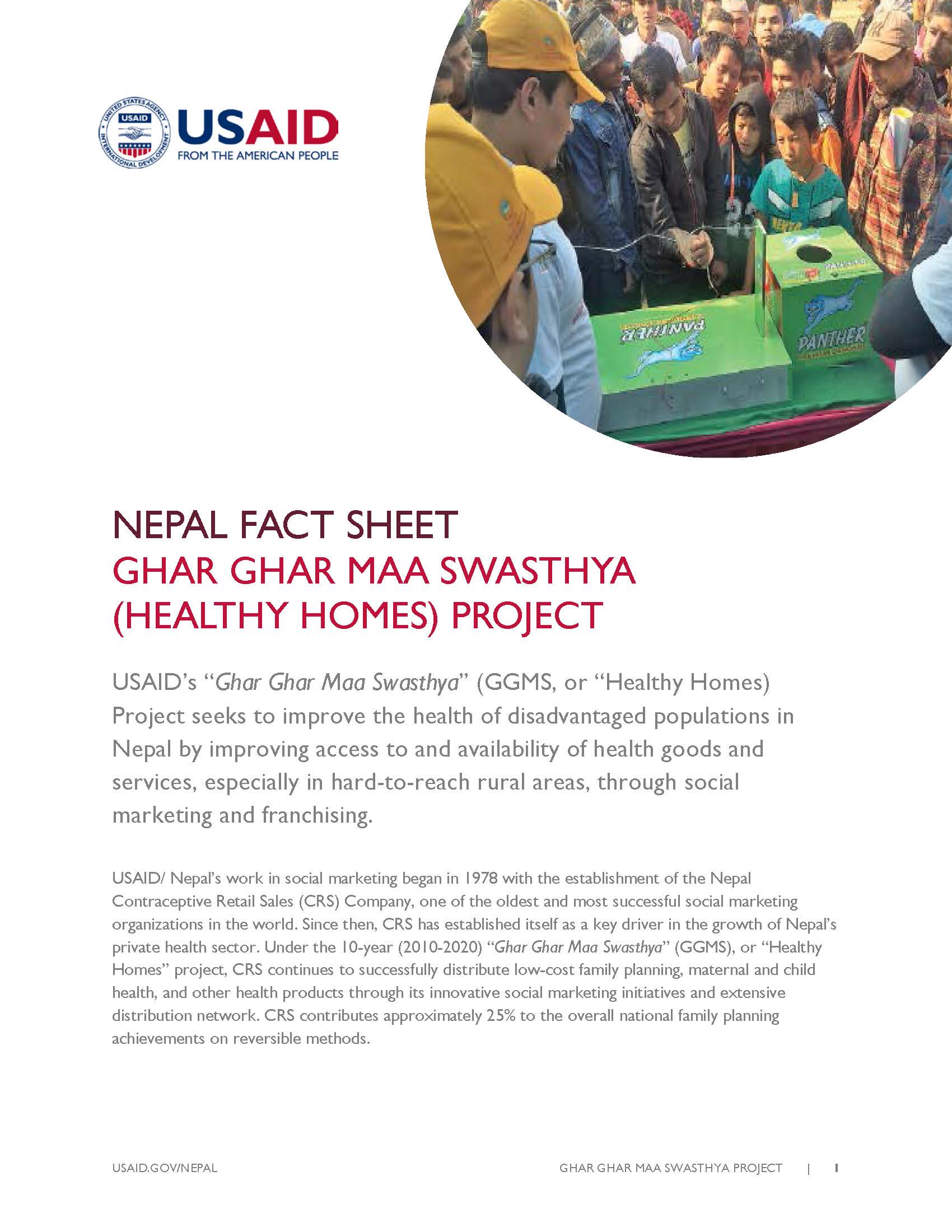Speeches Shim
USAID’s “Ghar Ghar Maa Swasthya” (GGMS, or “Healthy Homes) Project seeks to improve the health of disadvantaged populations in Nepal by improving access to and availability of health goods and services, especially in hard-to-reach rural areas, through social marketing and franchising.
USAID/ Nepal’s work in social marketing began in 1978 with the establishment of the Nepal Contraceptive Retail Sales (CRS) Company, one of the oldest and most successful social marketing organizations in the world. Since then, CRS has established itself as a key driver in the growth of Nepal’s private health sector. Under the 10-year (2010-2020) “Ghar Ghar Maa Swasthya” (GGMS), or “Healthy Homes” project, CRS continues to successfully distribute low-cost family planning, maternal and child health, and other health products through its innovative social marketing initiatives and extensive distribution network. CRS contributes approximately 25% to the overall national family planning achievements on reversible methods.
PROGRAM OBJECTIVES
Since 2010, GGMS has been building on the successes of previous USAID-funded projects by improving Nepal’s modern contraceptive prevalence rate; reducing mortality rates of mothers and children under the age of five (including newborns); and reducing the incidence of HIV/AIDS. Key strategies utilized by CRS include:
- Increasing CRS’s Independence and Sustainability: CRS constantly works to increase the sale of health commodities in existing markets and enters new markets in both urban and rural communities. These ongoing efforts strengthen CRS’ revenue generation and ability to reinvest in new product development and sales to further boost the company’s institutional sustainability.
- Evidence-Based and Consumer-Oriented Approach: CRS continually increases demand for family planning and reproductive health, maternal and child health, and sexually transmitted infections and HIV/AIDS prevention commodities and services through evidence-based, consumer-oriented approaches. These approaches target high risk and high need populations with data-driven brand marketing and behavior change messages delivered through social and behavior change communication.
- Improve Access: CRS improves community access to products and services in hard-to-reach areas and hot zones through innovative, entrepreneurial approaches and partnerships.
- Make CRS More Attractive to Donors: CRS creates a social marketing platform that provides donors with an attractive and cost effective option to fund incremental health outcomes.
- Strengthen Organizational Capabilities: CRS continually strengthens organizational policies and procedures, and skill sets of CRS to achieve GGMS project objectives.
SNAPSHOT OF ACHIEVEMENTS
In 1994, CRS was the first organization in the world to launch Sangini (Depo-Provera) through private medical outlets, branded as “Sangini” outlets. Today there are 3,381 Sangini outlets covering all 75 districts of Nepal and Sangini has become synonymous with injectables.
Nepal CRS Company generates demand for family planning and maternal and child health products and services, including modern methods of contraception among marginalized and vulnerable groups, through the targeted SBCC interventions of the Remote Area Initiative (RAI) program. Through RAI, CRS has reached 170,558 women of reproductive age with key messages: 53,518 women with family planning information, 37,996 women with information on antenatal care visits and childbirth in health facilities, 35,253 women with information on uterine prolapse and 43,791 women with information on health and hygiene.


Comment
Make a general inquiry or suggest an improvement.